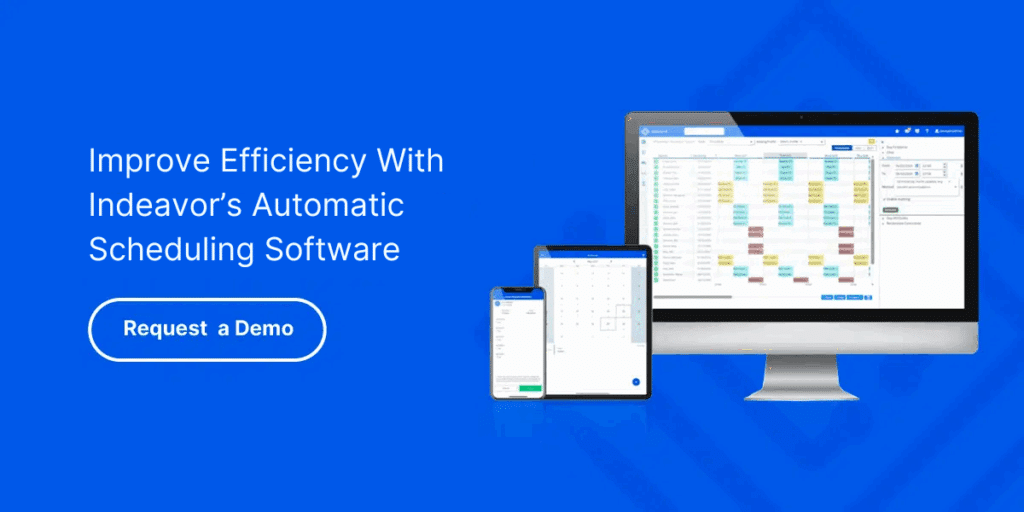Hospital employee scheduling is far more than filling time slots. An effective schedule directly impacts patient care, staff well-being, and organizational resilience. Yet, many hospitals still rely on rigid, manual schedules that leave employees feeling undervalued, overworked, and disconnected from their personal lives.
At Indeavor, we believe the future of hospital employee scheduling lies in a human-centered approach; one that blends real-time intelligence, labor alignment, and self-service flexibility. Our goal? To help hospitals operate efficiently without sacrificing the health of their workforce.

Why Traditional Hospital Employee Scheduling Falls Short
Manual Complexity in a 24/7 Environment
Hospitals never sleep, and neither do their scheduling demands. Legacy systems and spreadsheets simply aren’t built to accommodate real-time changes, such as last-minute call-offs or fluctuating patient census levels. This creates a heavy administrative burden on schedulers and managers, who are forced to patch together staffing coverage with limited tools and no automation.
As the workforce becomes more mobile and expectations around flexibility rise, the inefficiencies of manual processes become even more pronounced. Managers waste valuable time filling gaps manually instead of focusing on strategic workforce planning or patient care quality. In fast-paced clinical environments, the cost of these delays can ripple across departments, harming both employee morale and patient safety.
Employee Burnout and Turnover
Rigid, top-down scheduling often leads to chronic fatigue, especially for nurses and frontline healthcare workers. When employees have little control over their schedules, whether it’s being assigned back-to-back shifts or denied preferred time off, it directly contributes to disengagement.
In fact, 74% of nurses regularly work non‑9-to‑5 hours, creating a mismatch between staffing realities and employee well-being. This lack of flexibility erodes morale and fuels turnover, especially in departments already struggling with staffing shortages.
A staggering 85% of hospital nurses indicated plans to leave their roles within a year, reflecting serious concerns over job satisfaction and emotional well-being. When employees feel undervalued or ignored in the scheduling process, they’re more likely to seek roles elsewhere, often at institutions offering greater autonomy. It’s a lose-lose for hospitals trying to retain talent and deliver consistent patient care.
Compliance and Integration Blind Spots
Hospital employee scheduling isn’t just about availability; it’s also about ensuring every shift is legally compliant and appropriately staffed. From credential expirations to union agreements and state labor laws, hospitals must navigate a complex web of regulations. Yet most traditional scheduling systems aren’t equipped to enforce these requirements automatically.
In addition, many legacy platforms operate in silos, failing to integrate with critical systems like HRIS, payroll, and credentialing databases. This disconnect increases the risk of compliance violations and creates time-consuming manual work for administrators. Without centralized visibility, healthcare organizations are left vulnerable to errors, audits, and costly oversights.
What “People‑First” Hospital Employee Scheduling Looks Like
At its core, people-first hospital employee scheduling is about giving staff more control, clarity, and confidence in how their time is managed. It means shifting from a top-down, inflexible process to one that’s responsive to employee preferences and designed to support work-life balance. When employees feel heard and empowered, job satisfaction increases, and so does retention.
Traditional scheduling can leave staff feeling powerless, especially when shifts are assigned without input or opportunities to make changes. But when hospitals implement technology that prioritizes the employee experience, they create a more transparent, flexible, and equitable environment. Staff no longer have to guess what’s coming next; they can plan their lives, make real-time changes, and trust that their needs are factored into the system.
Here’s what a people operations-centered scheduling experience delivers for employees:
- Mobile App Self-Service: Employees can view their schedules anytime, anywhere, and take action. Whether it’s picking up open shifts, requesting PTO, or swapping with a coworker, they don’t have to wait on a manager to respond or approve.
- Employee Preferences: By having access to shift bidding, preferences, and availability tools, staff are more likely to get the shifts they want and fewer of the ones they don’t. This sense of agency helps reduce burnout and improve work-life integration.
- Fair Overtime and Shift Distribution: People-first scheduling automatically rotates nights, weekends, and holidays to avoid burdening the same individuals repeatedly. Staff can feel confident that the process is consistent and not driven by favoritism.
- Transparency and Visibility: With a digital record of scheduling rules, processes, and history, employees don’t have to guess why a decision was made. They gain visibility into how and when they’re scheduled, which builds trust in the system and leadership.
Ultimately, people-first scheduling gives hospital employees a voice and puts their time back in their hands. It’s not just about making life easier for managers; it’s about creating a workplace culture where flexibility and fairness aren’t perks, but expectations.
Enterprise‑Grade Features That Set Indeavor Apart
When workforce management systems can enforce complex rules, identify credential gaps, and adapt in real time, hospitals gain resilience and consistency across departments. Most importantly, these capabilities free up schedulers and managers to focus on supporting staff and improving patient care, rather than spending hours adjusting spreadsheets or chasing down paperwork.
- Real‑Time Adjustments: Adapt schedules instantly for no-shows or surges via mobile alerts and automated fill options. Schedulers react in minutes, not hours.
- Work Rules‑Based Scheduling: Configure complex policies, union rules, bidding preferences, and overtime limits. The system enforces them automatically.
- Skills & Certification Management: Indeavor prevents assigning caregivers whose certifications are expired or incomplete. Helping hospitals maintain compliance effortlessly.
- Employee Self‑Service: Staff can propose swaps, request time off, or volunteer for holidays using the mobile app; reducing managerial workload while increasing trust.
- Labor Analytics: Our labor alignment analytics shows scheduling accuracy and efficiency at every unit, shift, and employee level. These insights help leaders make proactive adjustments rather than reactive fixes.
- System Integrations: Seamlessly connects with HRIS, EHR, payroll, and credentialing platforms. Helping hospitals eliminate manual data silos and reduce errors.
For employees, these healthcare scheduling software features translate into a more reliable and transparent experience. Staff are notified quickly when changes occur, they’re assured that rules are being applied fairly, and they’re able to act without being bottlenecked by manual approval processes. With Indeavor, the scheduling infrastructure finally supports the human infrastructure it’s meant to serve.

Benefits That Extend Beyond Scheduling
Stronger Staff Retention and Morale
When employees feel like they have input into their schedules, their engagement and job satisfaction rise significantly. Empowering staff to influence when and how they work through tools like shift swapping, PTO requests, or time-off bidding, fosters a workplace culture that values flexibility and respect. Rather than feeling dictated to by rigid schedules, employees gain a greater sense of autonomy and trust in leadership.
This autonomy has a measurable impact on retention. In high-turnover environments like hospitals, even small gains in morale can lead to fewer resignations and a more stable workforce. With fewer grievances, less burnout, and more equitable shift distribution, managers can focus on building cohesive, high-performing teams, rather than being in a constant state of recruitment and training.
Compliance Peace of Mind
Compliance in healthcare is complex, but scheduling doesn’t have to be. Indeavor helps hospitals enforce labor rules and certification requirements automatically, reducing the risk of errors and violations. By embedding regulatory standards directly into the scheduling engine, hospitals can operate with confidence that every shift meets necessary legal, union, and organizational requirements.
Key compliance areas supported by Indeavor include:
- Rest period tracking to reduce fatigue-related safety risks
- Fatigue monitoring for overnight and extended-hour workers
- Audit-ready recordkeeping for labor law and union contract enforcement
- Credential validation to prevent unqualified staff from being scheduled
With these safeguards in place, healthcare staff scheduling software can shift from reactive corrections to proactive oversight. Leadership can stop chasing paper trails and start using data insights to improve workforce planning, optimize staffing levels, and meet compliance demands more efficiently.
Enhanced Patient Care
Ultimately, the most important outcome of smarter hospital employee scheduling is improved patient care. Rested, qualified, and well-aligned staff are more attentive, less prone to errors, and better equipped to handle the demands of fast-paced clinical environments. When caregivers aren’t scrambling to cover gaps or working excessive overtime, they’re more focused, present, and engaged at the bedside.
Hospitals that prioritize people-first scheduling see the benefits ripple outward, from higher patient satisfaction scores to lower incident rates and improved recovery outcomes. A well-run schedule doesn’t just serve the staff; it protects the quality, safety, and consistency of patient care across every department and shift.
Scaling Human-Centered Scheduling in Hospitals
In an industry defined by caregiving, hospital employee scheduling must treat employees like the assets they are. Software shouldn’t just plug shifts; it should respect personal lives, recognize skills, and adapt in real time.
Indeavor’s platform offers the automation, analytics, and flexibility needed to build schedules that work for people, not just processes. Say goodbye to shift mismatches and burnout from outdated rostering, and hello to empowered caregivers and efficient operations.
Take the next step: see how Indeavor can transform your scheduling into a strategic advantage. Book a demo today.
About the Author
Claire Pieper is the Digital Marketing Specialist for Indeavor. In her role, she specializes in crafting strategic and engaging content, ensuring that customers are well-informed. Claire is dedicated to enhancing the customer experience and optimizing the user journey through Indeavor’s solutions. To learn more or get in touch, connect with Claire on LinkedIn.



